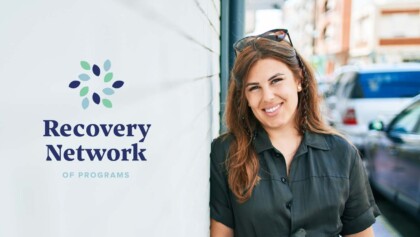Danielle Levesque, Director of Recovery Coach Services
AT RNP, we take pride in being a leader in the employment of recovery coaches throughout our agency. We understand the value of their work in our client’s recovery process, and thus, wanted to share our guidelines for coaching. RNP’s mission is to restore hope, health and well-being to individuals and families in a recovery environment that embraces compassion, dignity, and respect. We value and rely on the work of recovery coaches to carry out this mission by providing the essential layer of peer support to compliment the clinical work we do throughout our programs. In this packet you will find guidelines and resources to help you in your role as a Recovery Network of Programs Recovery Coach. As a certified recovery coach, you will be expected to act in a professional manner, adhere to all personnel policies and procedures, and seek supervision when in need of guidance. Below are some of the principles outlined and taught in CCAR’s Recovery Coach academy, mixed with suggestions based on advice from experience in the field.
Guidelines for all recovery coach positions:
-
Always fall back on your recovery coach training. You are not a clinician; therapist; or sponsor.!
The Four Goals of the Recovery Coach are:
- Promote recovery
- Remove barriers
- Connect people with recovery support services
- Encourage hope, optimism, and healthy living
The three recovery premises:
- All individuals are unique and have special needs, goals, health attitudes, and behaviors and expectations for recovery.
- Persons in recovery with mental illness, alcohol, or drug addiction, and /or gambling, share some similarities; however, management of their own lives and mastery of their futures will require pathways at times.
- All persons should be offered equal access to recovery and have the opportunity to participate in their own recovery process.
Ten components of recovery:
- Self-directed
- Individualized and person-centered
- Empowerment
- Holistic
- Non-linear
- Strength-based
- Peer supported
- Respect
- Responsibility
- Hope Definition of a Recovery Coach:
From CCAR: “A recovery coach is anyone interested in promoting recovery by removing barriers and obstacles to recovery, and by serving as a personal guide and mentor for people seeking or in recovery.” From William White: “ A recovery coach is a person who helps remove personal and environmental obstacles to recovery, links the newly recovering person to the recovering community, and serves as a personal guide and mentor in the management of personal and family recovery. Such supports are generated by mobilizing resources within the recovery community or provided by the recovery coach where such natural support networks are lacking.”
Roles and Responsibilities of a Recovery Coach:
- Motivator and cheerleader:
- believes in the capacity for change
- motivates
- encourages
- celebrates
- Ally and confidant:
- loyal
- cares for recoveree
- actively listens
- trustworthy
- stable and consistent
- Truth-teller:
- provides honest and helpful information
- offers suggestions
- helps to identify patterns of behavior
- Role model and motivator:
- offer one’s own life as an example of healthy living
- shows how…walks the walk
- does not sugar coat things
- provides stage-appropriate recovery information
- Problem-solver:
- identifies potential problem areas
- assists recoveree with problem solving
- does not tell the recoveree the right way but helps the recoveree discover options
- non-judgmental
- Resource broker:
- provides linkages to recovery community, treatment, and other supports
- knows system of care
- has established contacts and recovery partnerships in the community
- Advocate:
- “A”= advocate for the recovery community
- “a”= advocate for the recoveree
- assists recoveree
- Community organizer:
- helps establish a support network for recoveree
- serves as a connector
- Lifestyle consultant:
- Offers feedback on recovery lifestyle
- “How’s that working for you?”
- Focuses on recovery and wellness
- Discusses healthy choices Peer
- Equal
- Reduced power differential
2.) Active Listening and Motivational Interviewing Are Your Best Tools!
You’ve discovered how to lead a healthy and sober lifestyle by utilizing recovery tools and coping skills, so naturally you want to pass on all this advice to every client you meet, right? WRONG!
-
Actively listen to the needs of the client to get an understanding of where he/she is at in their recovery. Not everyone who is in treatment wants to/ or is ready to be there (remember those days?!) Try not to get frustrated if you are referred a client who isn’t quite ready for what you have to give. Let them know your door is open when they are ready.
-
Take what you have discovered by listening and use motivational interviewing to help the client come to their own conclusions about what steps they’d like to take next. You can use SMART goals worksheets to help clients plan out immediate tasks.
3.) Continue Your Training
It’s important to keep learning and growing in your craft. Knowledge is power! Take advantage of any trainings available to you in the behavioral health field by notifying your supervisor of your interest. The more you know about recovery pathways, mental health, coping skills, substance abuse, and the community around you, the better you can serve your clients.
4.) Embody Your Role
The more experience and knowledge you gain, the more empowered you will feel in your position. Your priority is to advocate for your client always, but from the coach perspective. There are times where clinical should take the lead, despite how you may feel. Be mindful that the experiences you may have had with treatment, medications, or certain institutions might not be what the client will experience. Remember, a coach is always meant to guide and lead by example, not give advice or try to shape outcomes.
5.) Seek Supervision
The boundary for recovery coaches and clients can get tricky. You may have clients who ask to connect with you outside of work or seek to be your friend once they know you are in recovery yourself. There may often be situations where you already know clients from meetings you attend or your neighborhood. You may need help or advice on how to guide a client. You may need to talk about your own work/life/recovery balance. Always seek supervision if you are unsure of how to handle a client or situation.


